Poetry in 3D – A review of BEOWULF
My cohort Aaron Webb penned this review of the recent computer-animated film… and as he knows the source material better than I, I’m posting his review first. I’ll post my own thoughts on the film next…
Changes to Poem Render Computer Animated Film Less Potent
by Aaron Webb
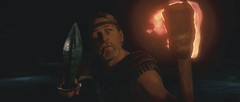 Robert Zemeckis’ Beowulf is a computer generated sword and sandals film that draws on the oldest known literature written in the English language: an epic poem rich in plot, history, and characterization.
Robert Zemeckis’ Beowulf is a computer generated sword and sandals film that draws on the oldest known literature written in the English language: an epic poem rich in plot, history, and characterization.
To fairly judge the film and the degree of its success we have to first understand the source from which the film was developed. The poem was composed somewhere between the 9th and 11th century and refers to people and events that may have occurred several hundred years before. Beowulf, a warrior hero from Geatland (aka Sweden), sails across the sea to help the Danish King Hrothgar fight Grendel, a monster who has been killing Hrothgar’s people for twelve years.
Since the time it was written down, Beowulf remained obscure until scholarly interest piqued in the 19th century. At first the poem was largely used only in the study of Old English. In the 20th century J.R.R. Tolkien was instrumental in building interest in the poem’s literary traits. The Hobbit borrows several elements from Beowulf, two of which appear as Gollum and the dragon Smaug. The most significant addition to the narrative was John Gardner’s Grendel, published in 1971, which paints the title monster as a misunderstood character as opposed to a heartless fiend. Michael Crichton’s 1976 novel The Eaters of the Dead changes the adversaries to allow the entire story to fit into Hrothgar’s kingdom.
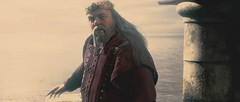 Given how long Hollywood has been making movies, it seems odd that only in the last ten years has anyone tried to adapt the story to the big screen. 1999 saw two Beowulf films: The 13th Warrior, an adaptation of The Eaters of the Dead and Beowulf, a science fiction adaptation of the first half of the poem. 2005 brought Beowulf and Grendel which strongly humanizes Grendel. In Zemeckis’ adaptation we see a nod to Gardner with a somewhat sympathetic and whiney Grendel (Crispin Glover). Also, the action is localized to Hrothgar’s kingdom a la The Eaters of the Dead.
Given how long Hollywood has been making movies, it seems odd that only in the last ten years has anyone tried to adapt the story to the big screen. 1999 saw two Beowulf films: The 13th Warrior, an adaptation of The Eaters of the Dead and Beowulf, a science fiction adaptation of the first half of the poem. 2005 brought Beowulf and Grendel which strongly humanizes Grendel. In Zemeckis’ adaptation we see a nod to Gardner with a somewhat sympathetic and whiney Grendel (Crispin Glover). Also, the action is localized to Hrothgar’s kingdom a la The Eaters of the Dead.
The way the film changes the themes of the story greatly influences the title character… The major themes of the poem are that heroes are real, and that leadership is based on sacrifice and humility. The poem portrays Beowulf as a Christ figure who endears himself to the reader through humble leadership and heroic sacrifice. Throughout the story Beowulf, Hrothgar, and others expound time and again that things such as protection, wealth, and success come from 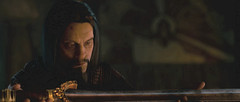 God and must be shared in humility. In the film Beowulf (Ray Winstone) and Hrothgar (Anthony Hopkins) have no reverence for a higher power. Unferth (John Malcovich), who, true to the poem, is a jerk, happens to be the only openly Christian character at the outset of the film. Consistently kicking his servant immediately after invoking the name of Jesus Christ, he is a picture of Christian hypocrisy.
God and must be shared in humility. In the film Beowulf (Ray Winstone) and Hrothgar (Anthony Hopkins) have no reverence for a higher power. Unferth (John Malcovich), who, true to the poem, is a jerk, happens to be the only openly Christian character at the outset of the film. Consistently kicking his servant immediately after invoking the name of Jesus Christ, he is a picture of Christian hypocrisy.
These changes in character bring us to the crux of the problem with the film as a whole: the portrayal of the hero Beowulf. The film focuses on the fallibility of men, and their seeming inability to resist temptation. The film denigrates heroes with the claim that the only motivation behind Beowulf and Hrothgar is fame and glory, rather than sacrifice and a humble concern for the well being of those they lead. The twist of making Grendel’s mother (Angelina Jolie) the source of all the problems hearkens back to The Eaters of the Dead and works well as a way to keep the story in one place, which is convenient for the film medium. While Jolie’s temptress is fine for the decadent Hrothgar, a Beowulf that also has no motivation other than vain glory and who falls to temptation is hard to get behind. It felt like there was no one to root in the film except Wiglaf (Brendan Gleeson) who is more humble than Beowulf and has the heart of a servant.
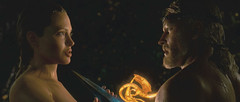 Still, rather than exalting him for his deeds, the film leaves us wondering if Wiglaf is just another would be hero unable to resist temptation. If writers Neil Gaiman and Roger Avery are not going to give us a Beowulf we can get behind, the least they could do is give us a Wiglaf we can root for. But then again, the film is entitled Beowulf, not Wiglaf.
Still, rather than exalting him for his deeds, the film leaves us wondering if Wiglaf is just another would be hero unable to resist temptation. If writers Neil Gaiman and Roger Avery are not going to give us a Beowulf we can get behind, the least they could do is give us a Wiglaf we can root for. But then again, the film is entitled Beowulf, not Wiglaf.
The problem of the film is not the rearrangement of the tale. Grendel’s mother as temptress is a great addition to the story and has the ability to unify the plot in such a way to make the poem more filmable. However, Beowulf as glory hound rather than leader cuts out the heart of what makes the original story great. The film focuses on the sins of the fathers being visited upon the sons in a seemingly never-ending chain. This inevitability of sin, even with the removal of the poem’s Christ figure, winds up validating the Christian belief that ultimately there is no hope for humanity without a savior. Though it seems that the writers consciously tried to avoid Christian meaning, this exchange simply removes the Christ figure in favor of a “Christ-shaped-hole”.
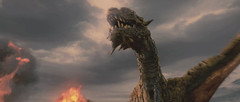 The cutting edge computer animation adds an extra dimension to the film (literally in some theaters). While amazing, this is a novelty that will soon wear off. What we are left with is a story that never really grabs you and leaves you floating. The fights are exciting, but in the first fight this excitement is hamstrung when we are constantly distracted by an Austin Powers variety of censorship. Given all the above, the final fight is the only part of the movie that one would call serious action, and even this is robbed by the way the film wraps up. Where Zemeckis’ Beowulf presents a grittier and more visceral version of the poem, it loses the ability to instruct about humble leadership and sacrifice. It trades instruction on how to face human depravity for a kind of fatalistic acceptance of it.
The cutting edge computer animation adds an extra dimension to the film (literally in some theaters). While amazing, this is a novelty that will soon wear off. What we are left with is a story that never really grabs you and leaves you floating. The fights are exciting, but in the first fight this excitement is hamstrung when we are constantly distracted by an Austin Powers variety of censorship. Given all the above, the final fight is the only part of the movie that one would call serious action, and even this is robbed by the way the film wraps up. Where Zemeckis’ Beowulf presents a grittier and more visceral version of the poem, it loses the ability to instruct about humble leadership and sacrifice. It trades instruction on how to face human depravity for a kind of fatalistic acceptance of it.


Great points. Good arguments. As a whole, though, the review leaves me with a wishy-washy feel that is inconclusive.
Yeah, I think the review reflects the film. The film has its high points, and is very wishy washy. This was one of the hardest reviews I have ever written.
Have you ever considered that the director may have been influnced by Gardner’s novel (which clearly points out the faults of man)?
Interesting Lee Ann, I’m not familiar with Gardner’s novel and will have to check it out…